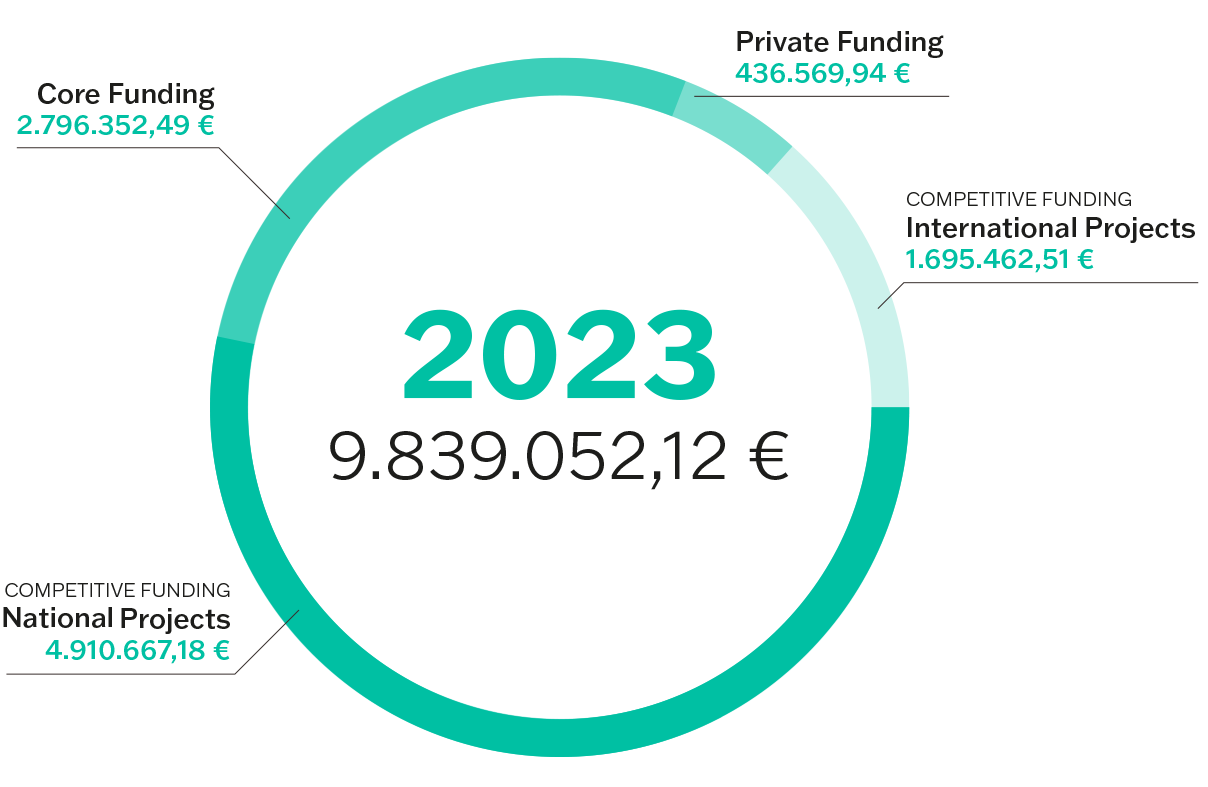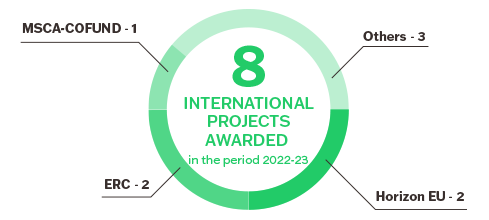BIENNIAL REPORT
2022-2023
Welcome
Welcome to CRAG’s 2022-2023 Institutional Report, now presented in an exciting new format. We are committed to sharing our scientific discoveries and achievements with everyone. Our redesigned report aims to provide clear, accessible insights into our work, reflecting our dedication to transparency and community engagement. We invite you to explore the innovative research and impactful results our team has accomplished, as we continue to push the frontiers of science for the benefit of all.
“CRAG has consolidated its role as an international reference in agrifood research. By increasing our efforts to strengthening bonds with public administrations and society, we envision that the starting new decade since its constitution, will witness the arrival of innovations to meet the social challenges related to food security and bioeconomy."
L. Maria Lois · CRAG Director
People & Talent
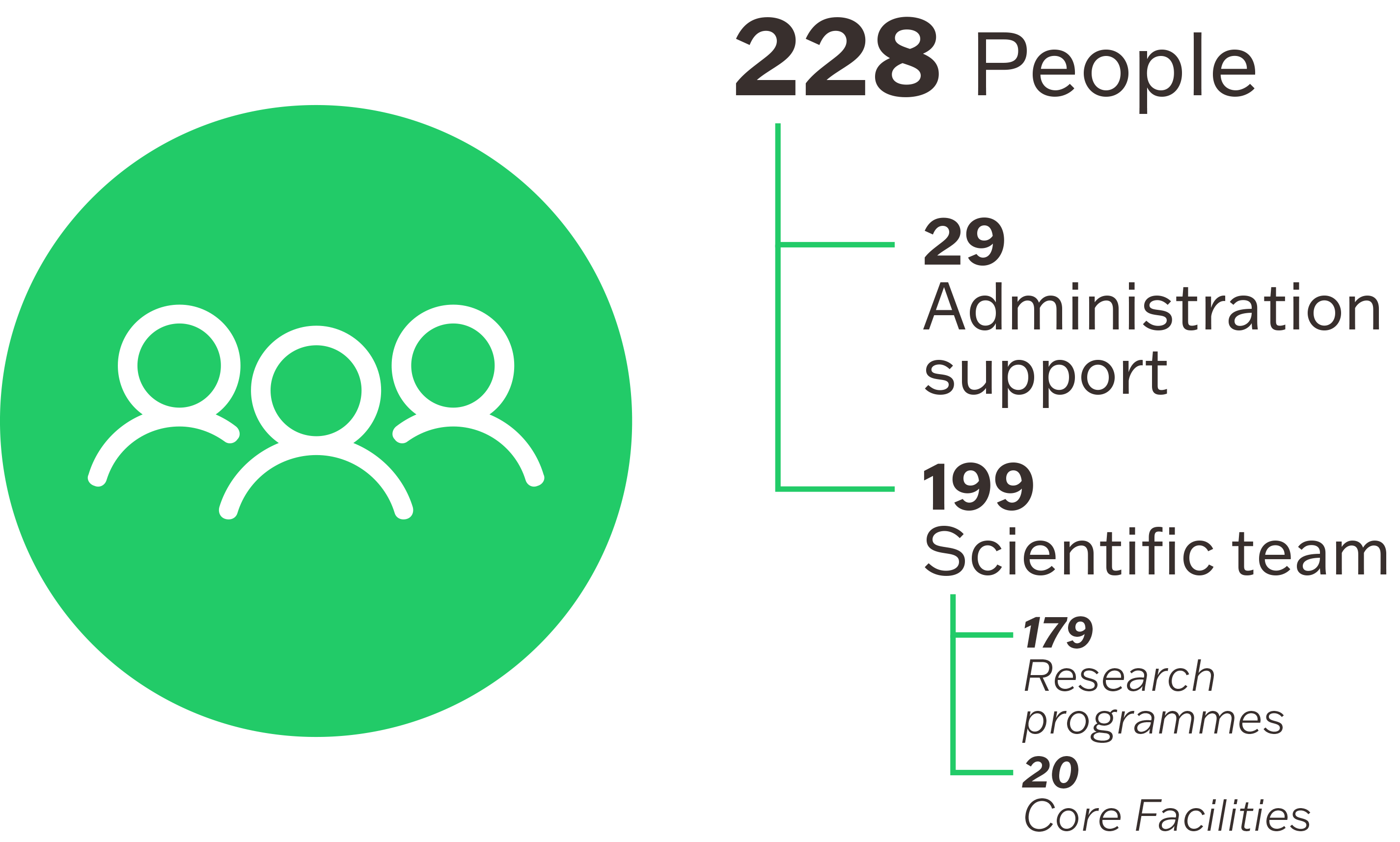
Women
53,5%
Women
Women
55%
International
PhD/Postdocs

HRS4R
In 2022-2023, CRAG has continued to strengthen its commitment to excellence in human resources management through various initiatives within the framework of the Human Resources Strategy for Researchers (HRS4R). We have reviewed and enhanced our selection and recruitment processes to ensure transparency and fairness, aligning them with the OTM-R principles (Open Transparent and Merit-based Recruitment). Additionally, continuous training programmes for researchers have been implemented, including training in soft skills and advanced technologies. We have actively promoted equal opportunities and diversity, as well as improved working conditions and staff well-being. These actions not only reinforce our commitment to excellence but also bring us closer to the renewal of the prestigious excellence seal, certifying our dedication to best practices in human resources for research.

Women in Science
CRAG has continued to advance its commitment to gender equality and the empowerment of women in science through CRAG’s Women in Science committee (WiS). This initiative, together with the Equality Plan, which concludes in 2024, has set ambitious new challenges aimed at fostering an inclusive and supportive environment for female researchers. We have implemented programs and policies designed to promote equal opportunities, reduce gender disparities, and support career development for women at all stages of their scientific careers. These efforts include mentorship programmes, and initiatives to increase the visibility and recognition of women’s contributions to science. As we approach the end of the current Equality Plan, CRAG remains dedicated to setting and achieving new goals that will continue to drive progress in gender equality and support the careers of women in science.
Training & Education
During this period, CRAG has placed a strong emphasis on training and education, as outlined on our dedicated Training and Education section on our webpage. We have been prepared to launch in 2024 a biannual Training Catalog, offering a comprehensive selection of professional development opportunities. This programme include training in soft skills, advanced technical competencies, and essential research methodologies, health and safety duties, aimed at enhancing the capabilities of our researchers. Additionally, the training programme has been instrumental in supporting the international training of young researchers in cutting-edge technologies, which will benefit all CRAG researchers and the Core Facilities. Through these initiatives, CRAG is committed to fostering continuous learning and development, ensuring that our researchers are well-equipped to meet the challenges of modern scientific research.
34
PhD Theses
2022-23 period
In addition, CRAG continued to coorganise, together with the Universitat Autònoma de Barcelona (UAB) and the University of Barcelona (UB), the Master’s in Plant Biology, Genomics and Biotechnology. Multiple CRAG researchers coordinate and give lectures of several subjects, and around 60% of the enrolled students (25 places) conduct their Master’s thesis at CRAG.
Talent
Attracting and retaining talented professionals is essential for maintaining our research center’s position at the forefront of scientific innovation. During the 2022-23 period, we are proud of the incorporation, in June 2022, of a new research group led by Robertas Ursache on “Plant Cell Wall Remodeling and Adaptation”. In addition, we highlight that CRAG was awarded an institutional MSCA COFUND grant from the EU: the rePLANT (Reconstruction Biology in Plant Sciences) Doctoral Training Program, coordinated by CRAG together with the Max Planck Institute for Plant Breeding Research (MPIPZ) and the John Innes Centre (JIC).
"We embrace diversity as a catalyst for creativity and innovation. The dedication and expertise of our team, together with internal capacitation and inspiration from international key research leaders, are the driving force behind our achievements."
L. Maria Lois · CRAG Director
JIC - John Innes Centre
Norwich, UK
MPIPZ - Max Planck Institute for Plant Breeding Research
Cologne, Germany
UPSC - Umeå Plant Science Center
Sweden
INRAE - Institut National de Recherche pour l'Agriculture, l'alimentation et l'Environnement
France
VIB - Vlaams Instituut voor Biotechnologie
Belgium
Accelerate Integration of Engineering and Agricultural Research using Artificial Intelligence (AI2EAR) Network-of-Networks
North Carolina, USA
National Taiwan University (NTU)
Taiwan

Internationalization
CRAG is steadfast in maintaining its longstanding, robust international collaborations (such as JIC-MPIPZ-CRAG and INUPRAG (INRAE-UPSC-CRAG) alliances) while actively establishing new partnerships with world-leading institutions. These efforts have culminated in the development of several joint research projects, facilitating the transfer of cutting-edge knowledge and tools across borders. Moreover, the Center is dedicated to promoting the training of young scientists, ensuring they are equipped with the skills and expertise needed to drive scientific advancement. Through these initiatives, CRAG continues to push the boundaries of scientific excellence on a global scale.
"Establishing strategic international collaborations and partnerships is at the core of CRAG's founding vision. We have an established and expanding network with leading institutions worldwide, which contributes to leverage diverse expertise and resources for groundbreaking research and innovation."
L. Maria Lois · CRAG Director
Research
Highlighted Publications
The following is a selection of significant publications from across the four different programmes within CRAG, reflecting the diverse and impactful work conducted by our teams.
101
PLANT DEVELOPMENT AND SIGNAL TRANSDUCTION
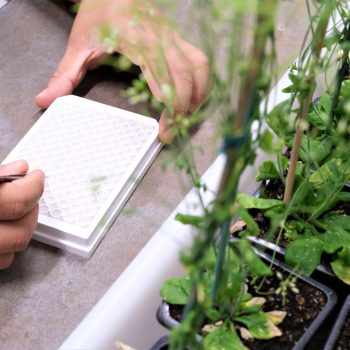
The circadian clock of the female organ in plants works in an autonomous manner
A study led by Paloma Mas published in Developmental Cell, revealed that the female reproductive organs of plants, the pistils, maintain circadian rhythms autonomously and independently from the rest of the plant.
In the study, the authors isolated the different components of the flower and observed that the pistils are the only floral organs capable of surviving and maintaining circadian rhythms in a very precise way. The work elucidated that the pistil clock controls processes as important as responses to environmental signals, photosynthesis and seed production, which might be useful in biotechnological applications for improving reproduction and productivity in crops of agronomic relevance.
Okada M, Yang Z, Mas P. Circadian autonomy and rhythmic precision of the Arabidopsis female reproductive organ. Developmental Cell (2022), DOI: 10.1016/j.devcel.2022.08.013
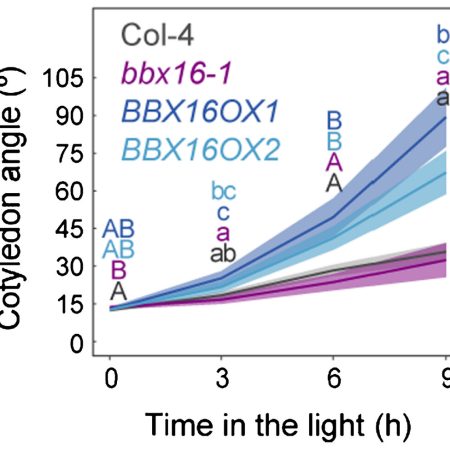
Identification of the molecular mechanisms regulating seedling morphogenesis in response to high light stress
A study led by Elena Monte published in New Phytologist identified a novel adaptive mechanism to protect germinating seedlings emerging into excess light, which is detrimental for chloroplast function and is therefore a threat for seedling and plant survival, especially in a scenario of climate change.
Researchers at CRAG identified the transcription factor BBX16 as a key regulatory protein acting to protect plant seedlings when they encounter light of potentially damaging intensity, a threat that is becoming more common due to climate change. High light induces chloroplast damage, and chloroplast-to-nucleus retrograde signaling is able to modify nuclear gene expression of BBX16 to modify the normal developmental pattern to protect the seedling against high irradiation stress. This study identified BBX16 as the first member of the BBX family involved in retrograde signaling, and defined a molecular mechanism to optimise seedling growth and ensure photoprotection in unfavourable light conditions.
Veciana N, Martín G, Leivar P, Monte E. BBX16 mediates the repression of seedling photomorphogenesis downstream of the GUN1/GLK1 module during retrograde signalling. New Phytologist (2022), DOI: 10.1111/nph.17975
PLANT RESPONSES TO STRESS
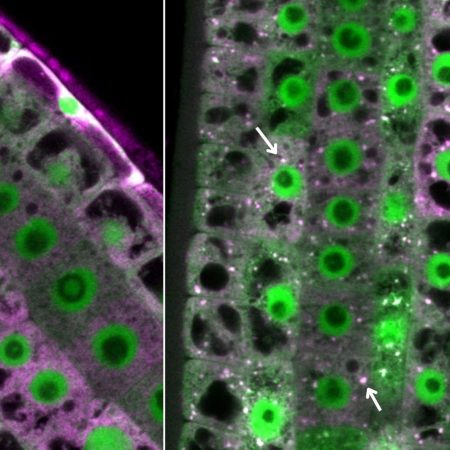
A plant protein is capable of dissolving protein aggregates related to various human pathologies
A team led by Núria Sánchez-Coll published a work in Plant Cell reporting that the plant protein MC1 is able to clear aggregates of misfolded proteins. These protein clusters tend to accumulate in situations of prolonged stress, with aging and in various amyloid and neurodegenerative diseases.
In the study, researchers unveil that MC1 participates in the formation and decomposition of “stress granules”, formed in plant cells under conditions of high temperatures. Besides, the increase in MC1 protein levels was reported to delay the effects of aging in leaves, decreasing the expression of genes involved in senescence. Remarkably, researchers found out that MC1 is also able to dissolve insoluble clusters of proteins involved in different human diseases, for example the one in Huntington’s disease. This study opens the door to possible new strategies to combat both the effects of high temperatures in plants and the aggregation of proteins involved in various diseases.
Ruiz-Solaní N, Salguero-Linares J, Armengot L, Santos J, Pallarès I, van Midden KP, Phukkan UJ, Koyuncu S, Borràs-Bisa J, Li L, Popa C, Eisele F, Eisele-Bürger AM, Hill SM, Gutiérrez-Beltrán E, Nyström T, Valls M, Llamas E, Vilchez D, Klemenčič M, Ventura S, Coll NS. Arabidopsis metacaspase MC1 localizes in stress granules, clears protein aggregates, and delays senescence. The Plant Cell (2023), DOI: 10.1093/plcell/koad172
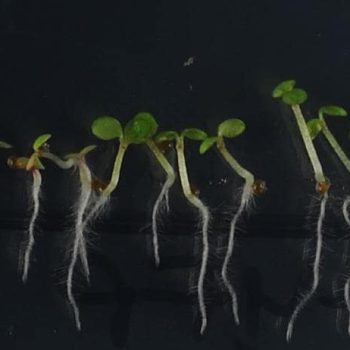
A mathematical model predicts the response of plants to climate change
A study led by Salomé Prat and researchers at CNB-CSIC in Madrid, published in Science Advances, identified the fundamental role of the COP1 protein as a growth promoter of Arabidopsis plants in long days and high environmental temperatures and its interaction with other cellular factors.
The data obtained in the study have been used to develop a mathematical model that associates the active levels of cellular factors regulated by light and temperature with the growth of the embryonic stem (the hypocotyl). The present work provides a unique tool to identify the best genetic combinations to optimize crops’ resilience to climate change.
Nieto C, Catalán P, Luengo LM, Legris M, López-Salmerón V, Davière JM, Casal JJ, Ares S, Prat S. COP1 dynamics integrate conflicting seasonal light and thermal cues in the control of Arabidopsis elongation. Science Advances (2022), DOI: 10.1126/sciadv.abp8412
PLANT SYNTHETIC BIOLOGY AND METABOLIC ENGINEERING
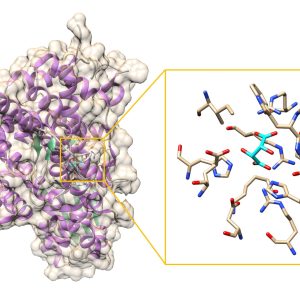
Improved itaconic acid production by using synthetic biology
Researchers at CRAG, in collaboration with researchers at Pohang University of Science and Technology in Korea, published a work in Nature Communications revealing a new strategy to improve itaconic acid production through synthetic biology technology.
Itaconic acid is used as a raw material for manufacturing cosmetics and antibacterial agents, as well as various plastics including biodegradable polymers. Despite such high potential, its use is limited by insufficient production technologies and high production costs. In this work, CRAG researchers used synthetic biology tools to create a new metabolic pathway that produces itaconic acid without the need of the physical separation in different cellular compartments. This technology enables the development of a microbial cell factory capable of producing itaconic acid in E. coli using low-cost raw materials. This novel discovery demonstrates the potential and wide applicability of synthetic biology tools, that could serve as an alternative to the existing petrochemical-based compound production methods.
Ye DY, Noh MH, Moon JH, Milito A, Kim M, Lee JW, Yang JS* (co-corresponding), Jung GY*. Kinetic compartmentalization by unnatural reaction for itaconate production. Nature Communications (2022), DOI: 10.1038/s41467-022-33033-1
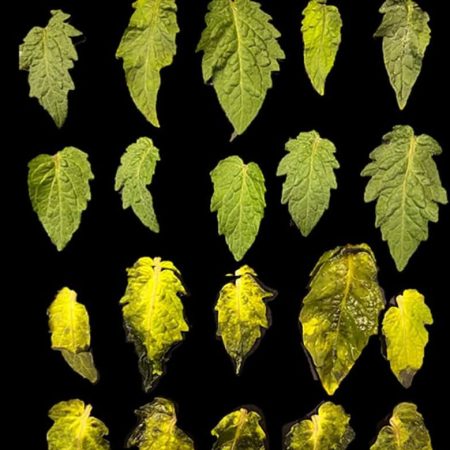
Effects of impaired steryl ester biosynthesis on tomato growth and developmental processes
A study led by Teresa Altabella and Albert Ferrer published in Frontiers in Plant Science characterized the specific role of the sterol acyltransferase enzymes SlASAT1 and SlPSAT1 in the tomato (Solanum lycopersicum cv. Micro-Tom) steryl ester biosynthetic pathway.
Using CRISPR/Cas9 knock-out mutants lacking one (slpsat1, slasat1) or both enzyme activities (slpsat1 x slasat1), the authors demonstrate the predominant role of SlPSAT1 on tomato steryl esters biosynthesis and the essential function of these metabolites in important plant developmental processes, like seed germination and leaf senescence.
Comparison of the results of this study with previous knowledge obtained using the equivalent Arabidopsis thaliana mutants found some interesting differences, such as the synergistic effect of SlASAT1 inactivation in the absence of a functional SlPSAT1 on the early germination and premature senescence phenotypes observed in tomato but not in Arabidopsis.
Burciaga-Monge A, López-Tubau JM, Laibach N, Deng C, Ferrer A, Altabella T. Effects of impaired steryl ester biosynthesis on tomato growth and developmental processes. Frontiers in Plant Science (2022), DOI: 10.3389/fpls.2022.984100
PLANT AND ANIMAL GENOMICS
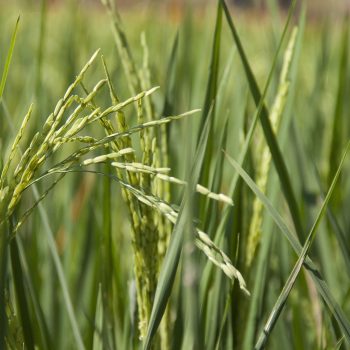
The movement of transposons gives rice a greater capacity for adaptation
A study lead by Josep Maria Casacuberta and Raúl Castanera and published in eLife reveals that transposons, DNA fragments that can change position within the genome, are a major source of variation in the expression of genes and can influence the response of crops to different environmental and agricultural conditions.
CRAG researchers, in collaboration with researchers of the New York University analysed how transposon insertions affect the variability of gene expression on rice populations subjected to domestication and selection by humans. The results of this study point transposons as key elements to take into account when studying genetic variability and reveal a molecular mechanism by which transposons can contribute to adaptation of crops to different ecological and agronomic conditions.
Castanera R, Morales-Díaz N, Gupta S, Purugganan M, Casacuberta JM. Transposons are important contributors to gene expression variability under selection in rice populations. eLife (2023), DOI: 10.7554/eLife.86324

Investigating the genetic basis of inbreeding depression for milk traits in goats
A study led by Marcel Amills has made possible to identify several genomic regions associated with inbreeding depression for milk traits in Murciano-Granadina goats.
Inbreeding depression can adversely affect traits related to fitness, reproduction and productive performance. In this work, CRAG researchers have used state-of-the art statistical techniques to map the genomic determinants of inbreeding depression for the somatic cell count, a parameter closely linked to the sanitary status of the mammary gland, to chromosomes 8 and 25. These genomic regions contain genes encoding integrins, chemokines and pathogen recognition receptors, which play relevant roles in the elicitation of innate immune responses against microbes. The results of this work demonstrate that keeping inbreeding to a minimum should contribute to decrease the incidence of mastitis, a leading cause of dairy goat culling.
Luigi-Sierra MG, Fernández A, Martínez A, Guan D, Delgado JV, Álvarez JF, Landi V, Such FX, Jordana J, Saura M, Amills M. Genomic patterns of homozygosity and inbreeding depression in Murciano-Granadina goats. Journal of Animal Science and Biotechnology (2022), DOI: 10.1186/s40104-022-00684-5
Highlighted Projects
During 2022 & 2023, CRAG has been awarded multiple competitive projects, both from national and international sources, supporting research groups and institutional projects alike, and significantly enhancing our capacity to conduct cutting-edge science.
Here we showcase some of the key projects:

ERC ‘Starting Grant’ to Ivan Reyna-Llorens
Ivan Reyna-Llorens, principal investigator of the Synthetic biology and photosynthesis laboratory, has been awarded a Starting Grant from the European Research Council (ERC), with his project METACAM – “Metabolic flexibility in drought: Leveraging Portulaca for defining design principles for a combined C4-CAM pathway”, to engineer plants resilient to high temperatures and drought conditions.
The METACAM project will study the mechanisms that plants use during water scarcity conditions to be able to generate crops that are more resilient to high temperatures and drought. Rising heatwaves and drought severely affect the capacity of crops to retain water and capture CO2 during photosynthesis, which results in global yield reductions. Some plants have specific metabolic pathways to cope with such stresses, for example the so-called Crassulacean Acid Metabolism (CAM) pathway, and CAM species are capable of thriving in water deprived environments. CRAG researchers will identify the basic molecular components underlying this and other processes to provide an increased resilience to water scarcity conditions.
Two Horizon EU Projects awarded
Researchers from CRAG Maria José Aranzana, Iban Eduardo, Laura Botigué and Raúl Castanera will participate in two recently awarded European projects, COUSIN and FRUITDIV, designed to recover genetic variability and promote sustainable agriculture.
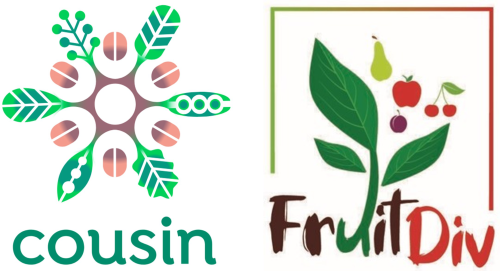
The project COUSIN – “Crop Wild Relatives utilisation and conservation for sustainable agriculture” has a particular focus on the concept of crop wild relatives (CWR) as “cousins” of traditional domesticated crops. In this way, its objective is to use CWRs as a valuable resource of agronomic interest, to promote a transition towards a more sustainable agriculture.
The project FRUITDIV – “Exploiting the Untapped potential of Fruit tree Wild DIVersity for Sustainable Agriculture” has the aim of monitoring, characterizing, utilizing, and conserving the diversity of CWR fruit trees, from the families of apple, pear, and cherry trees.

ERC ‘Proof of Concept’ to Ana I. Caño-Delgado
The European Research Council (ERC) has awarded a prestigious ‘Proof of Concept’ Grant to Ana I. Caño-Delgado, principal investigator of the Brassinosteroid signaling in plant development laboratory, to study adaptation of plants to climate change.
The project, entitled PLANeT – “PLant AdaptioN to Elevated Temperatures: mitigating crop losses caused by climate change”, will use new and disruptive strategies for targeting plant adaption to climate stress by using cell-type-specific genes that counteract the stress without penalizing growth of crops. Researchers will set up an effective method to fast-screen thousands of molecules as active ingredients for enhancing crops’ tolerance to elevated temperatures.
Bioluminescent microorganisms to illuminate cities
Jae-Seong Yan participates in BioLumCity, a singular project that aims to offer an advanced form of real bioluminescence based on bacteria and algae, with applications in architecture and urban design.

The project, co-led by Jae-Seong Yang and Alberto T. Estévez from International University of Catalonia (UIC), aims to use the bioluminescence of living organisms to create more natural lighting systems and to avoid night-time light pollution, meeting the human need for more natural, renewable and sustainable lighting that is not dependent on electricity.
"Our research ranges from fundamental science to advanced TRLs projects, as reflected in the diversity of European projects funded to CRAG researchers. This translates into the generation of medium and long term solutions to address the challenges agriculture confronts with the current climate crisis."
L. Maria Lois · CRAG Director
Impact

Meetings
& Workshops
Scientific meetings are vital for the dynamic exchange of knowledge and ideas within the global research community. At CRAG, we prioritize these events as they provide invaluable opportunities for our researchers to share their findings, gain insights from peers, and foster collaborations with scientists worldwide. By actively participating in and hosting these gatherings, we contribute to the collective advancement of science, staying at the forefront of innovation and ensuring our research has a broad and impactful reach.
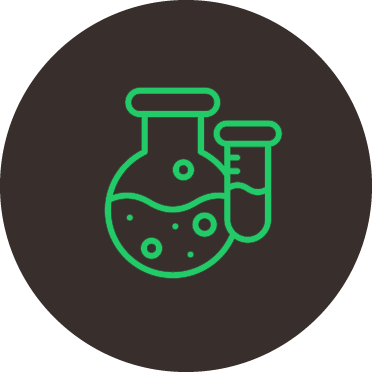
Science
Policy
At CRAG, we are deeply committed to shaping the future of plant science policy. Our institutional role extends beyond our research labs, as we actively participate in and contribute to key organizations such as the European Plant Science Organisation (EPSO) and Plant Europe Technology Platform (PlantETP). Our membership in these organizations allows us to influence policy decisions, advocate for plant science, and collaborate with other leading institutions across Europe.
Our researchers also play a crucial role in science policy-making, serving on various committees and expert groups in different international organisations.

Impact
on society
At CRAG, we believe in the transformative power of sharing knowledge with our stakeholders and the general public. Our commitment to public engagement and outreach is at the core of our mission, as we strive to promote scientific vocations and foster critical thinking throughout society. By disseminating our research findings through various channels and interactive programmes, we ensure that our scientific advancements contribute to an informed and engaged community.

Technology
Transfer
We are committed to transforming the knowledge generated through basic research into impactful innovations for society. Through strategic collaborations with companies and the productive sector, we facilitate the translation of scientific discoveries into practical applications. By generating patents and fostering the development of spin-offs, we ensure that our research leads to tangible benefits, driving technological advancement and economic growth.
Meetings with stakeholders about gene edition
6k
(in the period 2022-23)

Creation of the first CRAG spin-off
23
New contracts signed with companies
(in the period 2022-23)
"We are committed to making a tangible impact on citizens' daily lives through our research and innovations, as well as by promoting scientific careers and critical thinking in our society."
L. Maria Lois · CRAG Director
Funding

